COVID-19 Pandemic: Psychosocial Impact on the Elderly
VerifiedAdded on 2023/01/10
|7
|1783
|39
Report
AI Summary
This report comprehensively examines the psychosocial impact of the COVID-19 pandemic on the elderly population. It highlights the increased vulnerability of this demographic to the virus, emphasizing the high mortality rates and the role of pre-existing chronic illnesses. The report delves into the issues of loneliness and social isolation resulting from quarantine measures, discussing the importance of government support and access to essential services. It explores the impact of chronic illnesses, vulnerability, and potential neglect within healthcare settings. The report stresses the need for patient-centered healthcare decisions and the challenges faced by elderly carers. It addresses the mental health consequences, including depression, anxiety, and financial issues, and the importance of safe living environments. The conclusion emphasizes the necessity of comprehensive support systems for the elderly, including mental, financial, and environmental considerations, to ensure their safety and well-being during and after the pandemic.
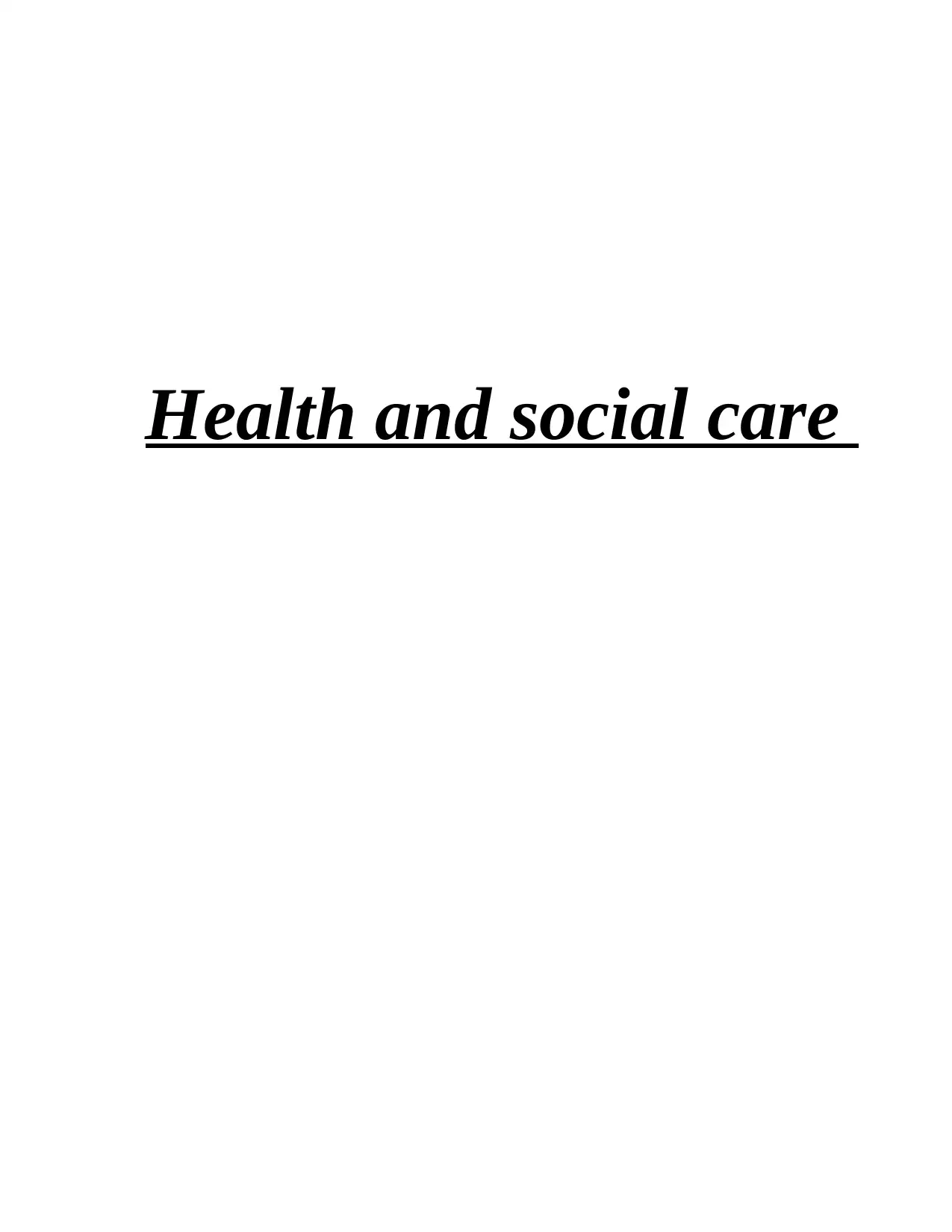
Health and social care
Paraphrase This Document
Need a fresh take? Get an instant paraphrase of this document with our AI Paraphraser
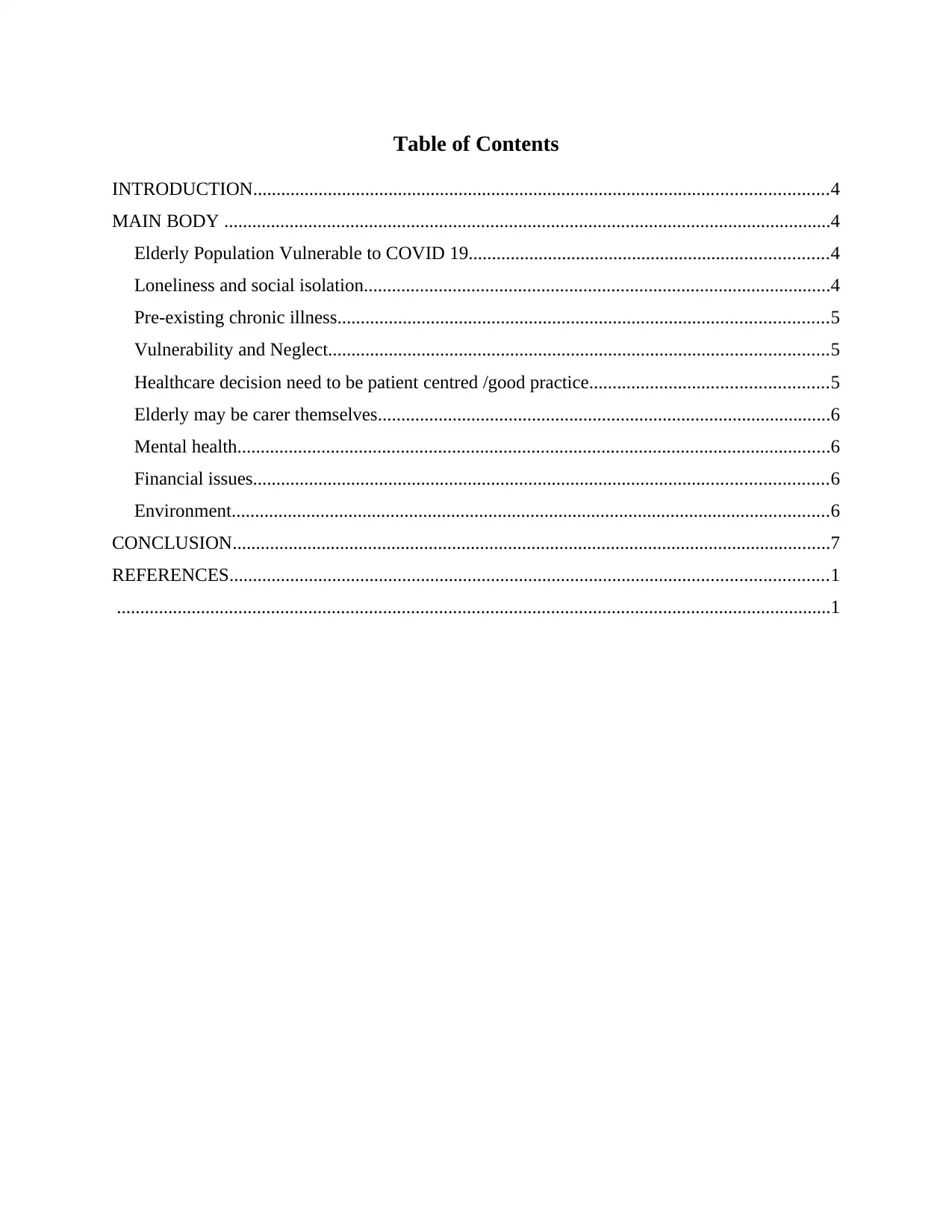
Table of Contents
INTRODUCTION...........................................................................................................................4
MAIN BODY ..................................................................................................................................4
Elderly Population Vulnerable to COVID 19.............................................................................4
Loneliness and social isolation....................................................................................................4
Pre-existing chronic illness.........................................................................................................5
Vulnerability and Neglect...........................................................................................................5
Healthcare decision need to be patient centred /good practice...................................................5
Elderly may be carer themselves.................................................................................................6
Mental health...............................................................................................................................6
Financial issues...........................................................................................................................6
Environment................................................................................................................................6
CONCLUSION................................................................................................................................7
REFERENCES................................................................................................................................1
.........................................................................................................................................................1
INTRODUCTION...........................................................................................................................4
MAIN BODY ..................................................................................................................................4
Elderly Population Vulnerable to COVID 19.............................................................................4
Loneliness and social isolation....................................................................................................4
Pre-existing chronic illness.........................................................................................................5
Vulnerability and Neglect...........................................................................................................5
Healthcare decision need to be patient centred /good practice...................................................5
Elderly may be carer themselves.................................................................................................6
Mental health...............................................................................................................................6
Financial issues...........................................................................................................................6
Environment................................................................................................................................6
CONCLUSION................................................................................................................................7
REFERENCES................................................................................................................................1
.........................................................................................................................................................1
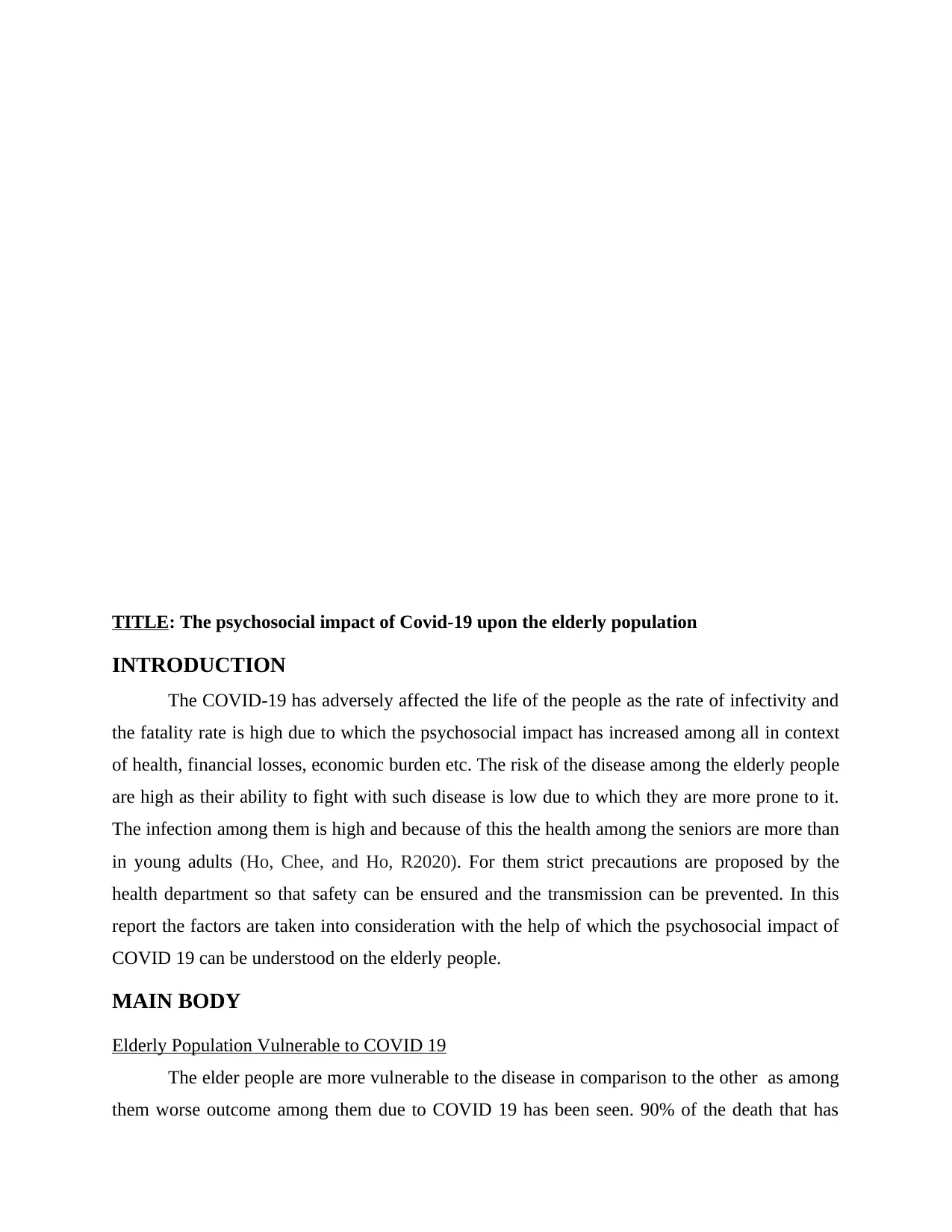
TITLE: The psychosocial impact of Covid-19 upon the elderly population
INTRODUCTION
The COVID-19 has adversely affected the life of the people as the rate of infectivity and
the fatality rate is high due to which the psychosocial impact has increased among all in context
of health, financial losses, economic burden etc. The risk of the disease among the elderly people
are high as their ability to fight with such disease is low due to which they are more prone to it.
The infection among them is high and because of this the health among the seniors are more than
in young adults (Ho, Chee, and Ho, R2020). For them strict precautions are proposed by the
health department so that safety can be ensured and the transmission can be prevented. In this
report the factors are taken into consideration with the help of which the psychosocial impact of
COVID 19 can be understood on the elderly people.
MAIN BODY
Elderly Population Vulnerable to COVID 19
The elder people are more vulnerable to the disease in comparison to the other as among
them worse outcome among them due to COVID 19 has been seen. 90% of the death that has
INTRODUCTION
The COVID-19 has adversely affected the life of the people as the rate of infectivity and
the fatality rate is high due to which the psychosocial impact has increased among all in context
of health, financial losses, economic burden etc. The risk of the disease among the elderly people
are high as their ability to fight with such disease is low due to which they are more prone to it.
The infection among them is high and because of this the health among the seniors are more than
in young adults (Ho, Chee, and Ho, R2020). For them strict precautions are proposed by the
health department so that safety can be ensured and the transmission can be prevented. In this
report the factors are taken into consideration with the help of which the psychosocial impact of
COVID 19 can be understood on the elderly people.
MAIN BODY
Elderly Population Vulnerable to COVID 19
The elder people are more vulnerable to the disease in comparison to the other as among
them worse outcome among them due to COVID 19 has been seen. 90% of the death that has
⊘ This is a preview!⊘
Do you want full access?
Subscribe today to unlock all pages.

Trusted by 1+ million students worldwide
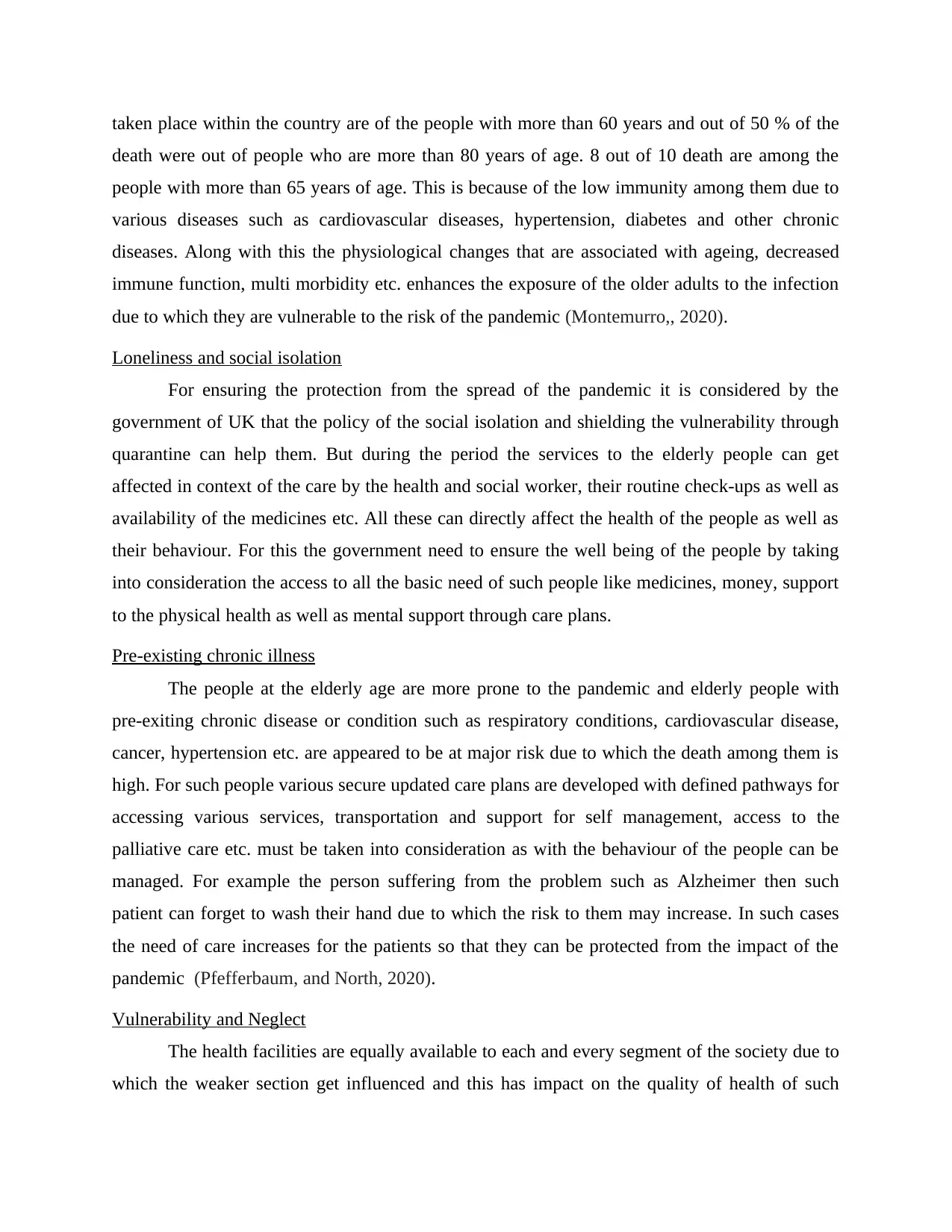
taken place within the country are of the people with more than 60 years and out of 50 % of the
death were out of people who are more than 80 years of age. 8 out of 10 death are among the
people with more than 65 years of age. This is because of the low immunity among them due to
various diseases such as cardiovascular diseases, hypertension, diabetes and other chronic
diseases. Along with this the physiological changes that are associated with ageing, decreased
immune function, multi morbidity etc. enhances the exposure of the older adults to the infection
due to which they are vulnerable to the risk of the pandemic (Montemurro,, 2020).
Loneliness and social isolation
For ensuring the protection from the spread of the pandemic it is considered by the
government of UK that the policy of the social isolation and shielding the vulnerability through
quarantine can help them. But during the period the services to the elderly people can get
affected in context of the care by the health and social worker, their routine check-ups as well as
availability of the medicines etc. All these can directly affect the health of the people as well as
their behaviour. For this the government need to ensure the well being of the people by taking
into consideration the access to all the basic need of such people like medicines, money, support
to the physical health as well as mental support through care plans.
Pre-existing chronic illness
The people at the elderly age are more prone to the pandemic and elderly people with
pre-exiting chronic disease or condition such as respiratory conditions, cardiovascular disease,
cancer, hypertension etc. are appeared to be at major risk due to which the death among them is
high. For such people various secure updated care plans are developed with defined pathways for
accessing various services, transportation and support for self management, access to the
palliative care etc. must be taken into consideration as with the behaviour of the people can be
managed. For example the person suffering from the problem such as Alzheimer then such
patient can forget to wash their hand due to which the risk to them may increase. In such cases
the need of care increases for the patients so that they can be protected from the impact of the
pandemic (Pfefferbaum, and North, 2020).
Vulnerability and Neglect
The health facilities are equally available to each and every segment of the society due to
which the weaker section get influenced and this has impact on the quality of health of such
death were out of people who are more than 80 years of age. 8 out of 10 death are among the
people with more than 65 years of age. This is because of the low immunity among them due to
various diseases such as cardiovascular diseases, hypertension, diabetes and other chronic
diseases. Along with this the physiological changes that are associated with ageing, decreased
immune function, multi morbidity etc. enhances the exposure of the older adults to the infection
due to which they are vulnerable to the risk of the pandemic (Montemurro,, 2020).
Loneliness and social isolation
For ensuring the protection from the spread of the pandemic it is considered by the
government of UK that the policy of the social isolation and shielding the vulnerability through
quarantine can help them. But during the period the services to the elderly people can get
affected in context of the care by the health and social worker, their routine check-ups as well as
availability of the medicines etc. All these can directly affect the health of the people as well as
their behaviour. For this the government need to ensure the well being of the people by taking
into consideration the access to all the basic need of such people like medicines, money, support
to the physical health as well as mental support through care plans.
Pre-existing chronic illness
The people at the elderly age are more prone to the pandemic and elderly people with
pre-exiting chronic disease or condition such as respiratory conditions, cardiovascular disease,
cancer, hypertension etc. are appeared to be at major risk due to which the death among them is
high. For such people various secure updated care plans are developed with defined pathways for
accessing various services, transportation and support for self management, access to the
palliative care etc. must be taken into consideration as with the behaviour of the people can be
managed. For example the person suffering from the problem such as Alzheimer then such
patient can forget to wash their hand due to which the risk to them may increase. In such cases
the need of care increases for the patients so that they can be protected from the impact of the
pandemic (Pfefferbaum, and North, 2020).
Vulnerability and Neglect
The health facilities are equally available to each and every segment of the society due to
which the weaker section get influenced and this has impact on the quality of health of such
Paraphrase This Document
Need a fresh take? Get an instant paraphrase of this document with our AI Paraphraser
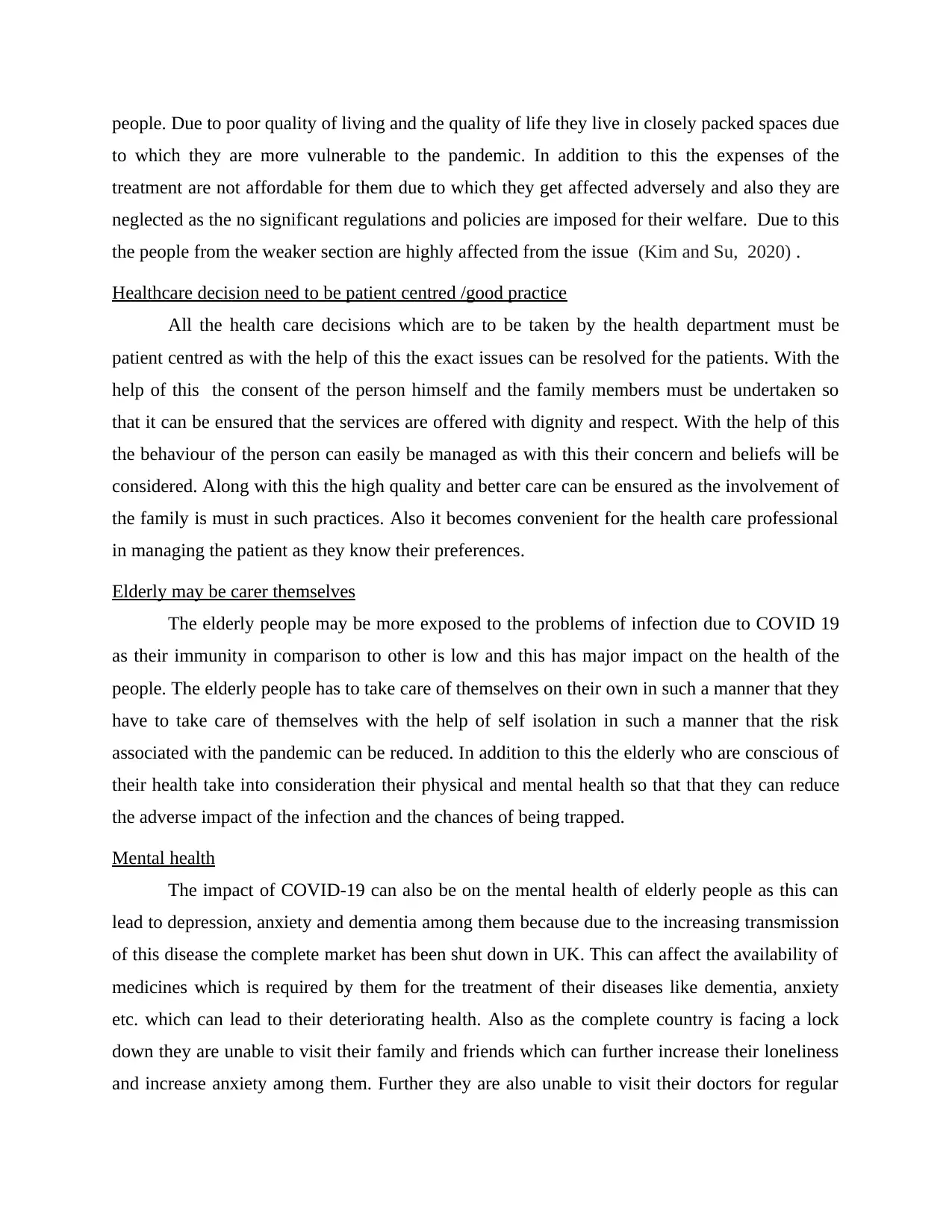
people. Due to poor quality of living and the quality of life they live in closely packed spaces due
to which they are more vulnerable to the pandemic. In addition to this the expenses of the
treatment are not affordable for them due to which they get affected adversely and also they are
neglected as the no significant regulations and policies are imposed for their welfare. Due to this
the people from the weaker section are highly affected from the issue (Kim and Su, 2020) .
Healthcare decision need to be patient centred /good practice
All the health care decisions which are to be taken by the health department must be
patient centred as with the help of this the exact issues can be resolved for the patients. With the
help of this the consent of the person himself and the family members must be undertaken so
that it can be ensured that the services are offered with dignity and respect. With the help of this
the behaviour of the person can easily be managed as with this their concern and beliefs will be
considered. Along with this the high quality and better care can be ensured as the involvement of
the family is must in such practices. Also it becomes convenient for the health care professional
in managing the patient as they know their preferences.
Elderly may be carer themselves
The elderly people may be more exposed to the problems of infection due to COVID 19
as their immunity in comparison to other is low and this has major impact on the health of the
people. The elderly people has to take care of themselves on their own in such a manner that they
have to take care of themselves with the help of self isolation in such a manner that the risk
associated with the pandemic can be reduced. In addition to this the elderly who are conscious of
their health take into consideration their physical and mental health so that that they can reduce
the adverse impact of the infection and the chances of being trapped.
Mental health
The impact of COVID-19 can also be on the mental health of elderly people as this can
lead to depression, anxiety and dementia among them because due to the increasing transmission
of this disease the complete market has been shut down in UK. This can affect the availability of
medicines which is required by them for the treatment of their diseases like dementia, anxiety
etc. which can lead to their deteriorating health. Also as the complete country is facing a lock
down they are unable to visit their family and friends which can further increase their loneliness
and increase anxiety among them. Further they are also unable to visit their doctors for regular
to which they are more vulnerable to the pandemic. In addition to this the expenses of the
treatment are not affordable for them due to which they get affected adversely and also they are
neglected as the no significant regulations and policies are imposed for their welfare. Due to this
the people from the weaker section are highly affected from the issue (Kim and Su, 2020) .
Healthcare decision need to be patient centred /good practice
All the health care decisions which are to be taken by the health department must be
patient centred as with the help of this the exact issues can be resolved for the patients. With the
help of this the consent of the person himself and the family members must be undertaken so
that it can be ensured that the services are offered with dignity and respect. With the help of this
the behaviour of the person can easily be managed as with this their concern and beliefs will be
considered. Along with this the high quality and better care can be ensured as the involvement of
the family is must in such practices. Also it becomes convenient for the health care professional
in managing the patient as they know their preferences.
Elderly may be carer themselves
The elderly people may be more exposed to the problems of infection due to COVID 19
as their immunity in comparison to other is low and this has major impact on the health of the
people. The elderly people has to take care of themselves on their own in such a manner that they
have to take care of themselves with the help of self isolation in such a manner that the risk
associated with the pandemic can be reduced. In addition to this the elderly who are conscious of
their health take into consideration their physical and mental health so that that they can reduce
the adverse impact of the infection and the chances of being trapped.
Mental health
The impact of COVID-19 can also be on the mental health of elderly people as this can
lead to depression, anxiety and dementia among them because due to the increasing transmission
of this disease the complete market has been shut down in UK. This can affect the availability of
medicines which is required by them for the treatment of their diseases like dementia, anxiety
etc. which can lead to their deteriorating health. Also as the complete country is facing a lock
down they are unable to visit their family and friends which can further increase their loneliness
and increase anxiety among them. Further they are also unable to visit their doctors for regular
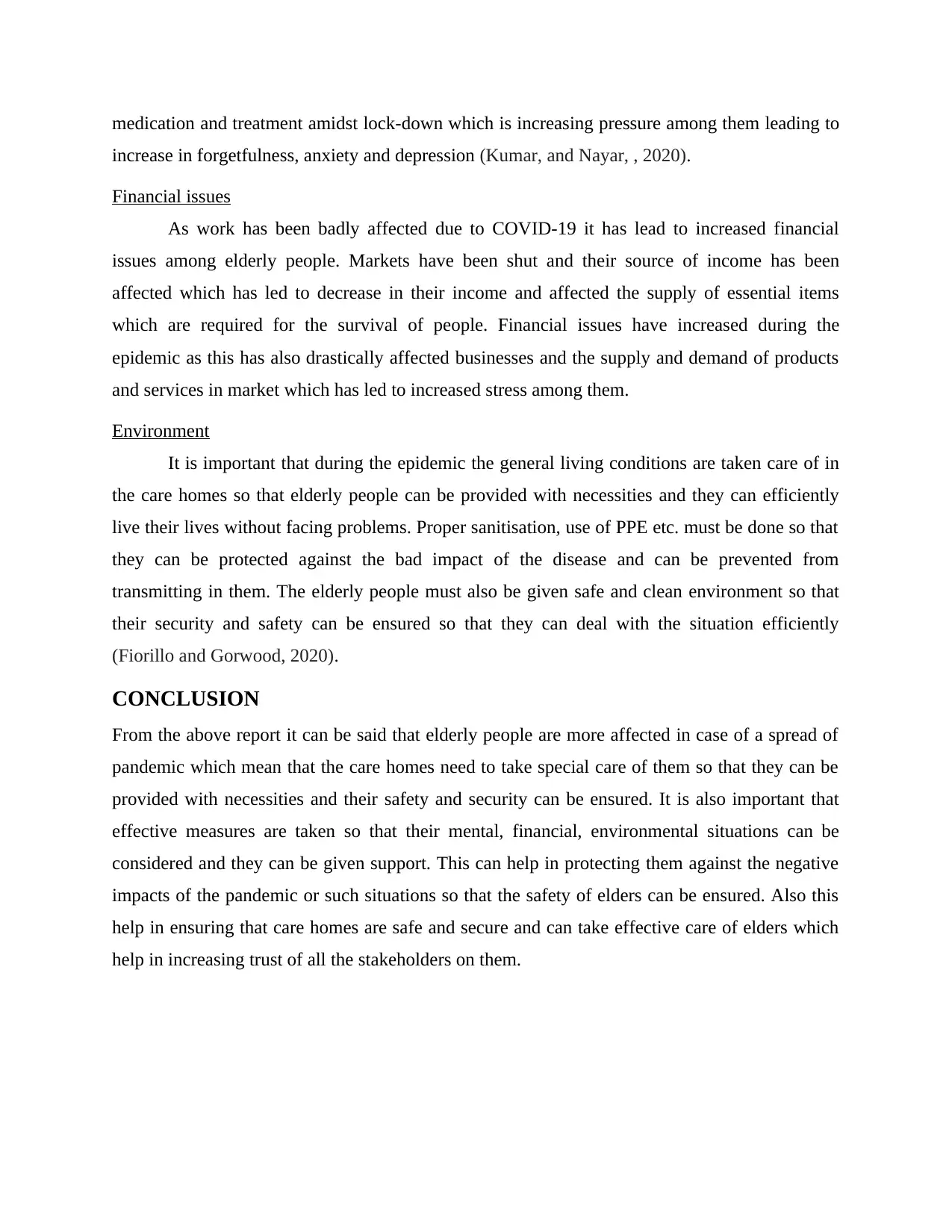
medication and treatment amidst lock-down which is increasing pressure among them leading to
increase in forgetfulness, anxiety and depression (Kumar, and Nayar, , 2020).
Financial issues
As work has been badly affected due to COVID-19 it has lead to increased financial
issues among elderly people. Markets have been shut and their source of income has been
affected which has led to decrease in their income and affected the supply of essential items
which are required for the survival of people. Financial issues have increased during the
epidemic as this has also drastically affected businesses and the supply and demand of products
and services in market which has led to increased stress among them.
Environment
It is important that during the epidemic the general living conditions are taken care of in
the care homes so that elderly people can be provided with necessities and they can efficiently
live their lives without facing problems. Proper sanitisation, use of PPE etc. must be done so that
they can be protected against the bad impact of the disease and can be prevented from
transmitting in them. The elderly people must also be given safe and clean environment so that
their security and safety can be ensured so that they can deal with the situation efficiently
(Fiorillo and Gorwood, 2020).
CONCLUSION
From the above report it can be said that elderly people are more affected in case of a spread of
pandemic which mean that the care homes need to take special care of them so that they can be
provided with necessities and their safety and security can be ensured. It is also important that
effective measures are taken so that their mental, financial, environmental situations can be
considered and they can be given support. This can help in protecting them against the negative
impacts of the pandemic or such situations so that the safety of elders can be ensured. Also this
help in ensuring that care homes are safe and secure and can take effective care of elders which
help in increasing trust of all the stakeholders on them.
increase in forgetfulness, anxiety and depression (Kumar, and Nayar, , 2020).
Financial issues
As work has been badly affected due to COVID-19 it has lead to increased financial
issues among elderly people. Markets have been shut and their source of income has been
affected which has led to decrease in their income and affected the supply of essential items
which are required for the survival of people. Financial issues have increased during the
epidemic as this has also drastically affected businesses and the supply and demand of products
and services in market which has led to increased stress among them.
Environment
It is important that during the epidemic the general living conditions are taken care of in
the care homes so that elderly people can be provided with necessities and they can efficiently
live their lives without facing problems. Proper sanitisation, use of PPE etc. must be done so that
they can be protected against the bad impact of the disease and can be prevented from
transmitting in them. The elderly people must also be given safe and clean environment so that
their security and safety can be ensured so that they can deal with the situation efficiently
(Fiorillo and Gorwood, 2020).
CONCLUSION
From the above report it can be said that elderly people are more affected in case of a spread of
pandemic which mean that the care homes need to take special care of them so that they can be
provided with necessities and their safety and security can be ensured. It is also important that
effective measures are taken so that their mental, financial, environmental situations can be
considered and they can be given support. This can help in protecting them against the negative
impacts of the pandemic or such situations so that the safety of elders can be ensured. Also this
help in ensuring that care homes are safe and secure and can take effective care of elders which
help in increasing trust of all the stakeholders on them.
⊘ This is a preview!⊘
Do you want full access?
Subscribe today to unlock all pages.

Trusted by 1+ million students worldwide
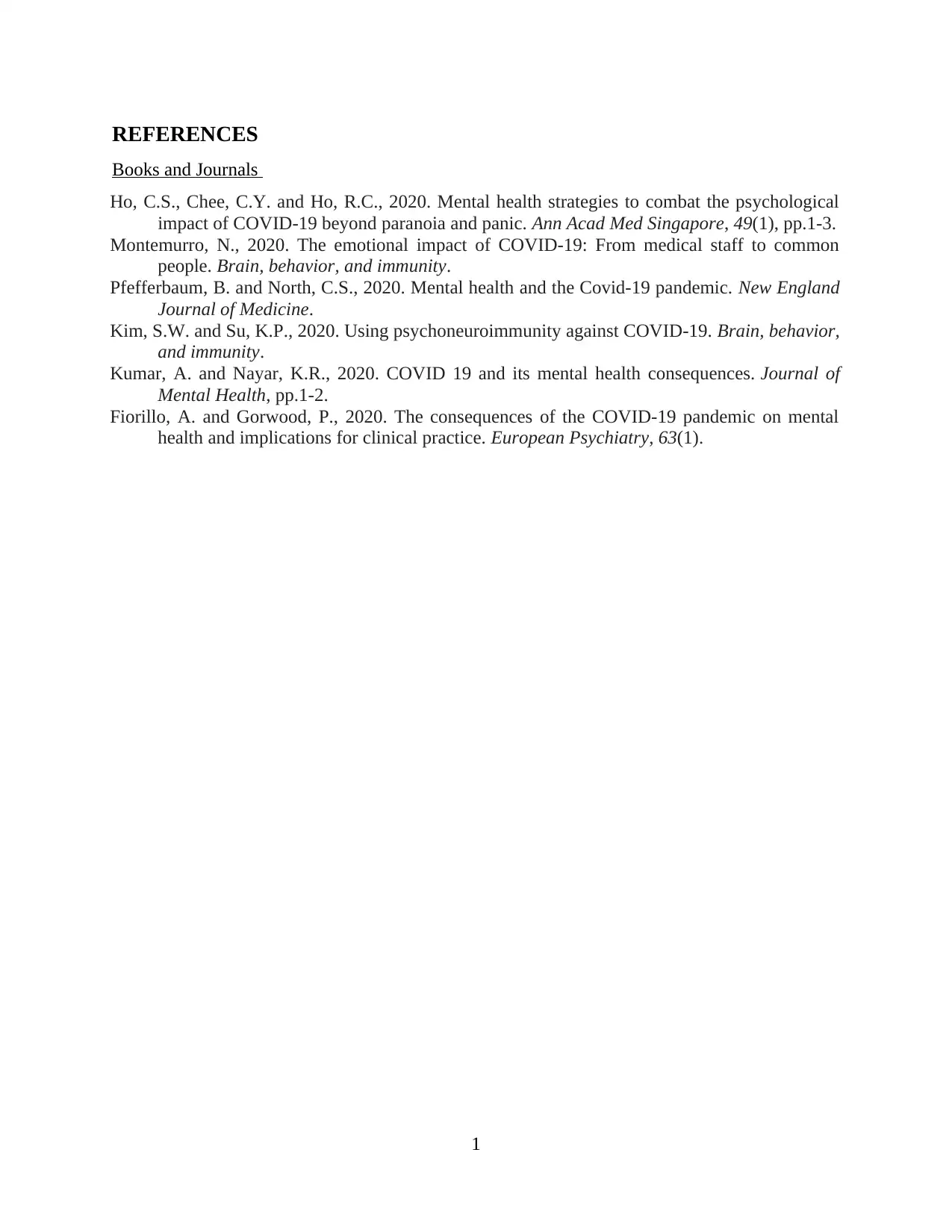
REFERENCES
Books and Journals
Ho, C.S., Chee, C.Y. and Ho, R.C., 2020. Mental health strategies to combat the psychological
impact of COVID-19 beyond paranoia and panic. Ann Acad Med Singapore, 49(1), pp.1-3.
Montemurro, N., 2020. The emotional impact of COVID-19: From medical staff to common
people. Brain, behavior, and immunity.
Pfefferbaum, B. and North, C.S., 2020. Mental health and the Covid-19 pandemic. New England
Journal of Medicine.
Kim, S.W. and Su, K.P., 2020. Using psychoneuroimmunity against COVID-19. Brain, behavior,
and immunity.
Kumar, A. and Nayar, K.R., 2020. COVID 19 and its mental health consequences. Journal of
Mental Health, pp.1-2.
Fiorillo, A. and Gorwood, P., 2020. The consequences of the COVID-19 pandemic on mental
health and implications for clinical practice. European Psychiatry, 63(1).
1
Books and Journals
Ho, C.S., Chee, C.Y. and Ho, R.C., 2020. Mental health strategies to combat the psychological
impact of COVID-19 beyond paranoia and panic. Ann Acad Med Singapore, 49(1), pp.1-3.
Montemurro, N., 2020. The emotional impact of COVID-19: From medical staff to common
people. Brain, behavior, and immunity.
Pfefferbaum, B. and North, C.S., 2020. Mental health and the Covid-19 pandemic. New England
Journal of Medicine.
Kim, S.W. and Su, K.P., 2020. Using psychoneuroimmunity against COVID-19. Brain, behavior,
and immunity.
Kumar, A. and Nayar, K.R., 2020. COVID 19 and its mental health consequences. Journal of
Mental Health, pp.1-2.
Fiorillo, A. and Gorwood, P., 2020. The consequences of the COVID-19 pandemic on mental
health and implications for clinical practice. European Psychiatry, 63(1).
1
1 out of 7
Related Documents
Your All-in-One AI-Powered Toolkit for Academic Success.
+13062052269
info@desklib.com
Available 24*7 on WhatsApp / Email
![[object Object]](/_next/static/media/star-bottom.7253800d.svg)
Unlock your academic potential
Copyright © 2020–2026 A2Z Services. All Rights Reserved. Developed and managed by ZUCOL.





